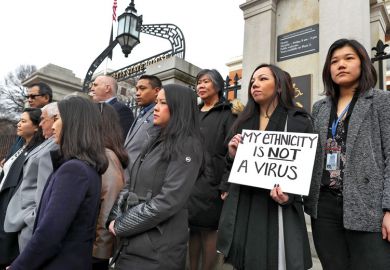Overseas students from China are experiencing racism and discrimination following the outbreak of the coronavirus, researchers in the UK and the Republic of Ireland have found, prompting warnings over potential lasting damage to internationalisation in the nations’ universities.
Academics from the Open University, Trinity College Dublin and the University of Surrey were working on a research project investigating how international students build networks with local students and the local community when the pandemic began.
The project, which has followed international students for the past eight years, recently followed the social interactions of 167 students at Surrey and 100 students at Trinity College Dublin over a period of three months from October to December 2019.
As the coronavirus spread, reports of xenophobic attacks on Asian students did too, so the team decided to interview international postgraduate students at the two universities, who they were already speaking with as part of the project, about their experiences since the outbreak. They immediately heard reports of discrimination and high levels of anxiety among the Chinese students.
“My students raised their concerns with me [when the outbreak started] and so we decided to delve into it in our project,” YingFei Héliot, one of the researchers and a lecturer in organisational behaviour at Surrey Business School, told Times Higher Education. She said it was very clear that the global pandemic had changed the experiences of Chinese students in Ireland and the UK, who “told us of being shouted and sworn at, and even chased”.
“Our findings show that international students from China are experiencing very high levels of anxiety, discrimination and insecurity living through the coronavirus period,” she said.
The researchers have spoken to 22 international students so far and found that all the Chinese students they spoke to had faced xenophobic remarks.
One Asian student told the researchers they were arguing with a flatmate on a separate issue, but were then suddenly told “you brought the virus”.
Others have faced hostility outside campus, such as local people shouting “Coronavirus, Chinese” and swearing at one Chinese student who wore a facemask. A group of female Chinese students said they were chased by local teenagers down the street, who shouted “virus, Chinese virus” at them.
Dr Héliot said the frequency of these incidents seems to be increasing with the rising tensions around the coronavirus. She said that even as it has become more commonplace to wear facemasks in the UK, the team heard that Asian students who wore masks were still subject to comments.
She said many of the students spoken to had begun “employing a coping strategy known as self-navigating” in response to outside behaviour.
Before the pandemic, the students were proactive in engaging in social interaction and were keen to engage with local communities, Dr Héliot said. Now, some would only socialise with groups from similar cultural backgrounds, she added.
An African student told researchers about their Chinese friend’s experience of racism, who was told to “go back to your country, that kind of thing”.
“He [the Chinese student] was so sad…he went to tears…He doesn’t come out of his room. He doesn’t go out grocery shopping. Nothing,” the African student said.
The team’s ongoing research shows that many international students have decided to return to their home country, largely at the request of their parents, but also due to fear of racism and discrimination directed at them. “I have to go to China, it could be dangerous for me to stay here,” one said.
Dr Héliot said discrimination could have a “long-lasting damaging effect” on international students at UK universities and the sector must act now to combat any anti-Chinese rhetoric. “These stories will spread…we have to do something now, we need to create a psychologically safe environment for every student,” she added.
Register to continue
Why register?
- Registration is free and only takes a moment
- Once registered, you can read 3 articles a month
- Sign up for our newsletter
Subscribe
Or subscribe for unlimited access to:
- Unlimited access to news, views, insights & reviews
- Digital editions
- Digital access to THE’s university and college rankings analysis
Already registered or a current subscriber? Login




